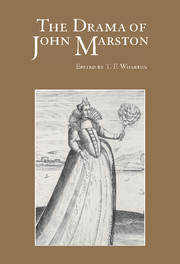Book contents
- Frontmatter
- Contents
- Notes on contributors
- Acknowledgements
- Note on the text
- Introduction
- 1 John Marston at the ‘mart of woe’: the Antonio plays
- 2 John Marston: a theatrical perspective
- 3 Varieties of fantasy in What You Will
- 4 Safety in fiction: Marston's recreational poetics
- 5 Insatiate punning in Marston's courtesan plays
- 6 Touching the self: masturbatory Marston
- 7 ‘Two parts in one’: Marston and masculinity
- 8 The Malcontent: hunting the letter
- 9 The Dutch Courtesan and the profits of translation
- 10 Sexual politics in Marston's The Malcontent
- 11 Marston: censure, censorship, and free speech
- 12 Ill-mannered Marston
- Index
7 - ‘Two parts in one’: Marston and masculinity
Published online by Cambridge University Press: 01 October 2009
- Frontmatter
- Contents
- Notes on contributors
- Acknowledgements
- Note on the text
- Introduction
- 1 John Marston at the ‘mart of woe’: the Antonio plays
- 2 John Marston: a theatrical perspective
- 3 Varieties of fantasy in What You Will
- 4 Safety in fiction: Marston's recreational poetics
- 5 Insatiate punning in Marston's courtesan plays
- 6 Touching the self: masturbatory Marston
- 7 ‘Two parts in one’: Marston and masculinity
- 8 The Malcontent: hunting the letter
- 9 The Dutch Courtesan and the profits of translation
- 10 Sexual politics in Marston's The Malcontent
- 11 Marston: censure, censorship, and free speech
- 12 Ill-mannered Marston
- Index
Summary
Feminist scholarship tends to stress the extent to which women in the early modern period were valued only in terms of their commodity value in male-to-male exchanges, and that the primary ties in that society were in fact male-to-male. Luce Irigaray argues that although patriarchal society appears to be heterosexual it is in fact homo-social because the relationships that are acknowledged in patriarchy are political and economic ones amongst men:
The historical system of brotherhood is in fact hom(m)o-sexual in nature. Heterosexuality is nothing but the assignment of economic roles … for in this culture the only sex, the only sexes, are those needed to keep relationships among men running smoothly … Reigning everywhere, although prohibited in practice, hom(m)osexuality is played out through the bodies of women, matter, or sign, and heterosexuality has been up to now just an alibi for the smooth working of man's relationship with himself, of relationships among men.
Ana Castillo clarifies that, when commodities are ‘given value by men and exchanged by men, but men themselves cannot enter … as commodities’, woman ‘does not exist except as an object of transaction … [and] except through male perception’.
In Jacobean society, though some scholars stress the exceptions, women were dependent rather than autonomous. The distribution of economic resources based on the laws of primogeniture and patriarchal inheritance favoured older men above younger men and men over women.
- Type
- Chapter
- Information
- The Drama of John MarstonCritical Re-Visions, pp. 124 - 144Publisher: Cambridge University PressPrint publication year: 2001



